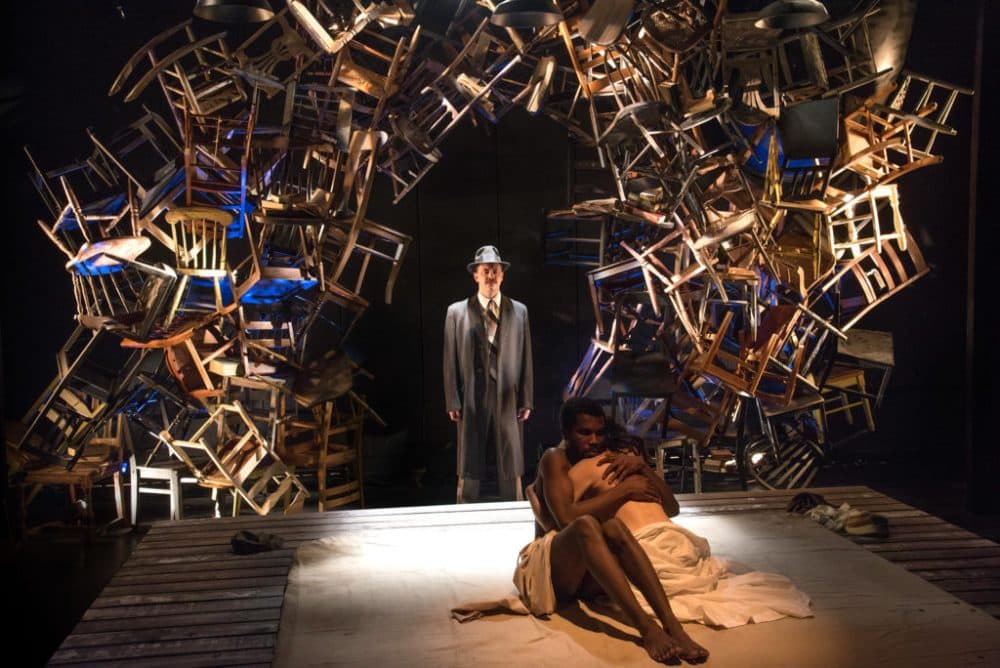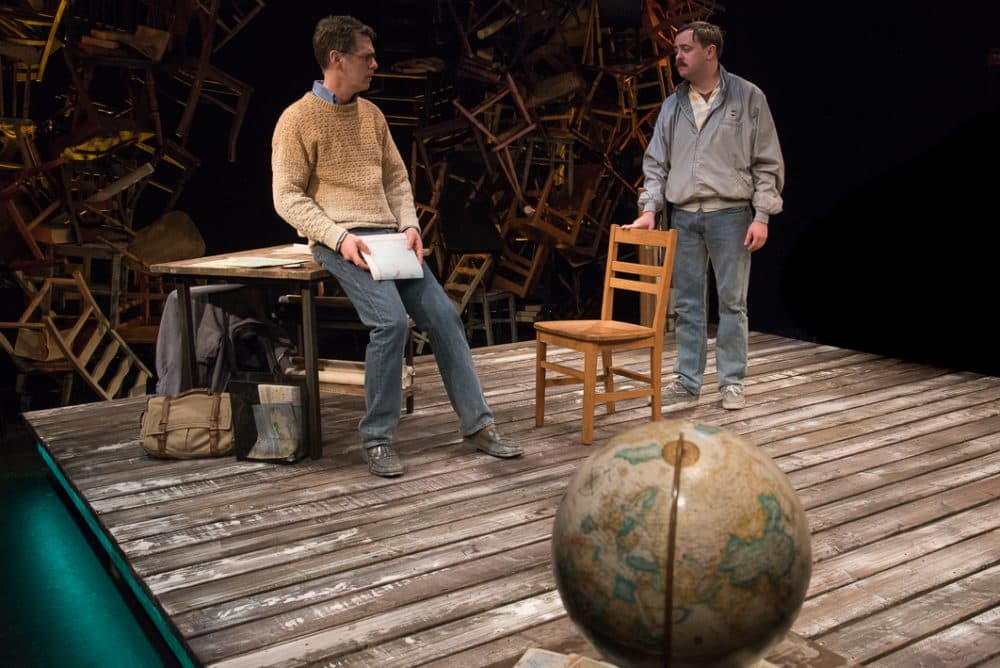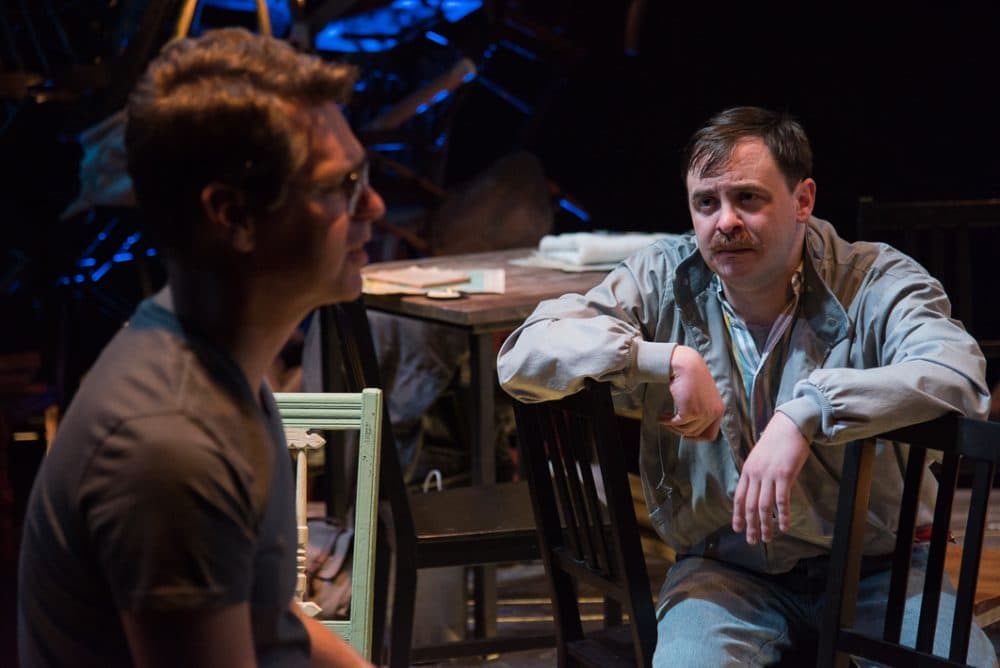Advertisement
Review
New Rep's 'Statements After An Arrest' And 'Lonely Planet' Leave You Weary And Open-Hearted

New Repertory Theatre’s “Statements of Survival” series (which started with “Unveiled” last month and will conclude with “Ripe Frenzy” later this month) continues with a pair of politically charged plays from decades past.
1972’s “Statements After An Arrest Under the Immorality Act,” an intense (almost) two-hander and anti-apartheid statement written by South African playwright Athol Fugard, matches well with Steven Dietz’s 1993 AIDS drama “Lonely Planet,” also intense and very much a two-hander. I saw the two a week apart; that seems about right, given that one thing they have in common is a raw ability to wring you out and leave you sad and weary, yet open-hearted.
The plays, now running in repertory through early March, resonate powerfully with each other, partly because they are both helmed by New Rep artistic director Jim Petosa, and partly because they are presented in the same black box space. Seeing them both feels like a complete experience; the two don’t necessarily complete each other's sentences, as it were, but each of them does, in a way, round out the meditations and insights the other provokes. More to the point, the pairing makes for an emotionally complete and symmetrical journey, taking us through circles of fear, suffering, desire and loss to a place of regretful acceptance. (Happy endings are in short supply here.) In many ways the two works run parallel, being examinations of how love and sexuality — painful and bewildering enough as it is — can become unbearable if weaponized by a hostile social order.

Going into “Statements After An Arrest,” I was cautioned at least twice by different theater personnel that the show contains full frontal nudity. I was also notified once about a strobe light effect. Consider yourself duly warned, although to be honest, the nudity is something you stop noticing about two minutes in.
Playwright Athol Fugard intends the actors’ state of undress to reflect their emotional vulnerability, as well as their legal liability. The way their full display of contrasting skin tones illustrates how they are left nowhere to hide by the hotly righteous (and hotly prurient) scrutiny of government agencies and nosy neighbors alike.
Philander (Michael Ofori), a “colored” man, lives in a poor village where he serves as a school principal. He’s also married, but even so, he finds himself carrying on a surreptitious affair with Frieda (Eve Kagan), a “European” — that is to say, white — woman, and the librarian of the wealthier, better-appointed town nearby. Their devotion is primal, and primary; they’re two people in love. But the stress fractures that result from the political and social pressures they face run just as deeply and touch on core issues of fear, resentment and racial power differentials.

The secular sin the two are committing is, of course, sexual intimacy across color lines, but Fugard is just as interested in the ways in which lovers can lash out at (and pull away from) one another, and how controlling governmental forces can exploit inevitable fault lines in any relationship.
Personifying those authoritarian forces is a third actor, Tim Spears, who shows up briefly on a few occasions. Spears plays a policeman, and he’s not just dressed but overdressed — swaddled in tie and jacket, vest and hat. The policeman’s voice lacks the pathos and poetry of Philander, whose life is a series of evasions and compromises. Nor does the policeman seem to possess the depth of longing, and of conscience, that Frieda displays; his is an accounting that takes place in past tense, a dry and remorseless narrative that reduces human motive and conduct to matters of law and transgression. Instead of illumination — something the moonlight-drenched lovers strive for in their earnest pillow talk — the policeman ushers in the shaming flares of popping camera bulbs, incinerating tenderness and leaving only the ashes of incrimination.
Advertisement
By contrast, Dietz’s “Lonely Planet” shows how unremitting, accusatory social attitudes can shrink and alienate the human soul. Fretful map store owner Jody (Michael Kaye) has the world at his fingertips through the wares he offers, but he’s increasingly unwilling to venture out of his shop and into the wider world. His hyper-kinetic, younger friend Carl (Tim Spears, another bridge between the two plays) shows up often, darting into and out of the shop like a hummingbird and bringing chairs with him — lots and lots of chairs.

As the story unfolds — and it does so like a map, only gradually revealing the contours of the terrain it’s exploring — it becomes clear that Carl (a spinner of tall tales who likes to invent details about his nonexistent careers as an art restoration specialist and an auto glass installer) is a volunteer who helps clear out the homes of people who have died of AIDS. The chairs strike him as too lonely and sad to leave for bargain hunters or trash men, so he gathers them up. Jody’s store is the only place he knows of big enough to accommodate them. Over Jody’s objections, the chairs keep coming, crowding the store like a collection of headstones. If Jody won’t leave his hidey-hole and face up to the epidemic, then Carl will import something of the experience to the private little country where Jody dwells.
Fugard lays out a couple of simple ideas and lets us marinate in them. Dietz, by contrast, loads up his play with ideas, concepts and references as though excitedly filling a plate at a buffet. Ties to Ionesco’s absurdist play “The Chairs” abound (Carl and Jody even debate what happens after that play’s inscrutable end, in an exchange that sounds like a veiled discussion of whether there might be an afterlife). Jody’s professorial musings on different sorts of maps and the distortions they entail drip with existential meaning; even the dreams Jody relates — dreams triggered by second hand clothing, some of it fetishistic — rumble with layers of psychological significance.

Dietz swirls all this around before distilling it into the sweetest and most moving exchange in the play: “You know what’s great about us?” Carl asks Jody. “We never fell in love.” Friends, he goes on to add — in answer to a complaint Jody raised earlier — are “a mystery.” And so too is friendship: Unfathomable, and yet intimate; rife with boundaries, and yet suffused with affection and trust; like Jody’s maps, given to all sorts of distortion, and yet the only thing that sustains our voyages.
The simple wooden floor by scenic designer Jeffrey Petersen is equally effective for both plays, and Matthew Guminski’s lighting — rife with moody effects that include saturated colors on the margins, silvery illuminations pouring from above, and white light flooding up from beneath the floorboards — adapts fluently from one production to the other. The one discordant note is an archway of chairs at the back of the performance space. In the context of “Lonely Planet,” that installation comes to be deeply moving, a visual shorthand for the show’s major themes, but it’s utterly out of place in “Statements After an Arrest.” Then again, like the nudity, it’s not an impediment; you stop seeing it after a little while.
“Statements After an Arrest Under the Immorality Act” continues through March 3. “Lonely Planet” continues through March 4. Both plays are at the BlackBox at the Mosesian Center for the Arts in Watertown.